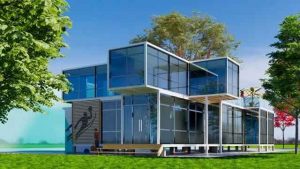In the fast-changing modern society, people's demand for living space is becoming increasingly diversified and personalized. Due to the limitations of long cycle, high cost and poor flexibility, the traditional construction mode has been difficult to meet the market's urgent demand for high-efficiency, environmentally friendly and personalized housing.
Prefabricated houses, as a major innovation in modern construction technology, are leading a new round of changes in living space with their unique flexible and customized features, bringing unprecedented possibilities for people's lifestyles.

Click here
I. Prefabricated House: Definition and Advantages
Prefabricated houses, as the name suggests, are houses in which the main components of the building (e.g. walls, floor slabs, roofs, etc.) are pre-produced in factories in accordance with standardized designs and then transported to the construction site for assembly.
This construction method not only greatly shortens the construction period and reduces the environmental impact of on-site operations, but also improves the consistency and controllability of building quality through industrialized production. More importantly, the flexible customization characteristics of prefabricated houses make them an ideal choice to meet the needs of personalized living.
II. Flexible customization: all-round satisfaction from design to life
1. High degree of freedom in the design stage
The design process of prefabricated houses makes full use of digital technology and BIM (Building Information Modeling) technology, enabling designers and owners to make unlimited modifications and optimizations in the virtual environment.
Whether it is the overall layout of the house, the choice of style, or the details, such as the location of doors and windows, color matching, and the choice of materials, all can be customized according to the owner's personal preferences and actual needs. This highly free design allows each prefabricated house to become a unique work of art, perfectly integrated into the owner's philosophy of life.
2. Flexible application of modular design
The modular design of prefabricated houses is the core of their flexible customization. By dividing the house into multiple independent modular units, each unit can be adjusted or replaced as needed, allowing for rapid changes in spatial layout. For example, changes in the family structure (e.g., when children grow up and need independent space) can be easily handled by adding or subtracting the corresponding functional modules.
In addition, the modular design also facilitates upgrading and repair and replacement of the house, which extends the service life of the house and reduces maintenance costs.
3. The pursuit of environmental protection and sustainability
In the process of flexible customization, prefabricated houses also focus on environmental protection and sustainability. Through the use of green building materials, optimized energy use (such as solar photovoltaic panels, rainwater collection systems, etc.), and the implementation of waste classification and recycling, prefabricated houses have demonstrated significant advantages in reducing environmental pollution and improving resource utilization efficiency.
This adherence to the concept of environmental protection is not only in line with the development trend of contemporary society, but also creates a healthier and more comfortable living environment for the occupants.
In recent years, many successful cases of flexible customized prefabricated houses have emerged at home and abroad. For example, some developers have launched the “Smart Apartment” series, which realizes the efficient use of space and personalized customization through modular design.
Users can choose different functional room modules according to their needs, such as study, gym, children's play area, etc., and realize intelligent control of the whole house through the smart home system. In addition, some post-disaster reconstruction projects have also adopted prefabricated housing technology, which effectively alleviates the housing problems of the affected people by quickly building temporary shelters and permanent housing, and also demonstrates the unique value of prefabricated housing in responding to emergencies.
Conclusion
The flexible and customized characteristics of prefabricated houses is not only a profound change to the traditional building model, but also a bold exploration of the future living space. It allows us to see the infinite possibilities of harmonious coexistence of architecture with people and nature.
With the continuous progress of science and technology and the improvement of people's living standards, we have reason to believe that prefabricated houses will play a more important role in the field of future construction, bringing more convenience and beauty to human living.
In this process, we look forward to more innovation and practice, and jointly promote the continuous improvement and development of prefabricated housing technology, contributing to the construction of a more livable and sustainable urban environment.
Know more:https://baijiahao.baidu.com/s?id=1804416911104281576&wfr=spider&for=pc
Post time: 08-01-2024







